Collaborative Nursing Practice for Mental Health Disorders
VerifiedAdded on 2022/12/18
|11
|2423
|27
AI Summary
This paper discusses the theory of collaborative nursing practice and its significance in treating mental health disorders. It explores the experiences of nurses and patients in this approach to nursing, emphasizing the importance of trust, respect, and rapport in the treatment process.
Contribute Materials
Your contribution can guide someone’s learning journey. Share your
documents today.

Running head: MENTAL HEALTH - NURSING
Mental Health – Nursing
Name of Student:
Name of University:
Author Note:
Mental Health – Nursing
Name of Student:
Name of University:
Author Note:
Secure Best Marks with AI Grader
Need help grading? Try our AI Grader for instant feedback on your assignments.
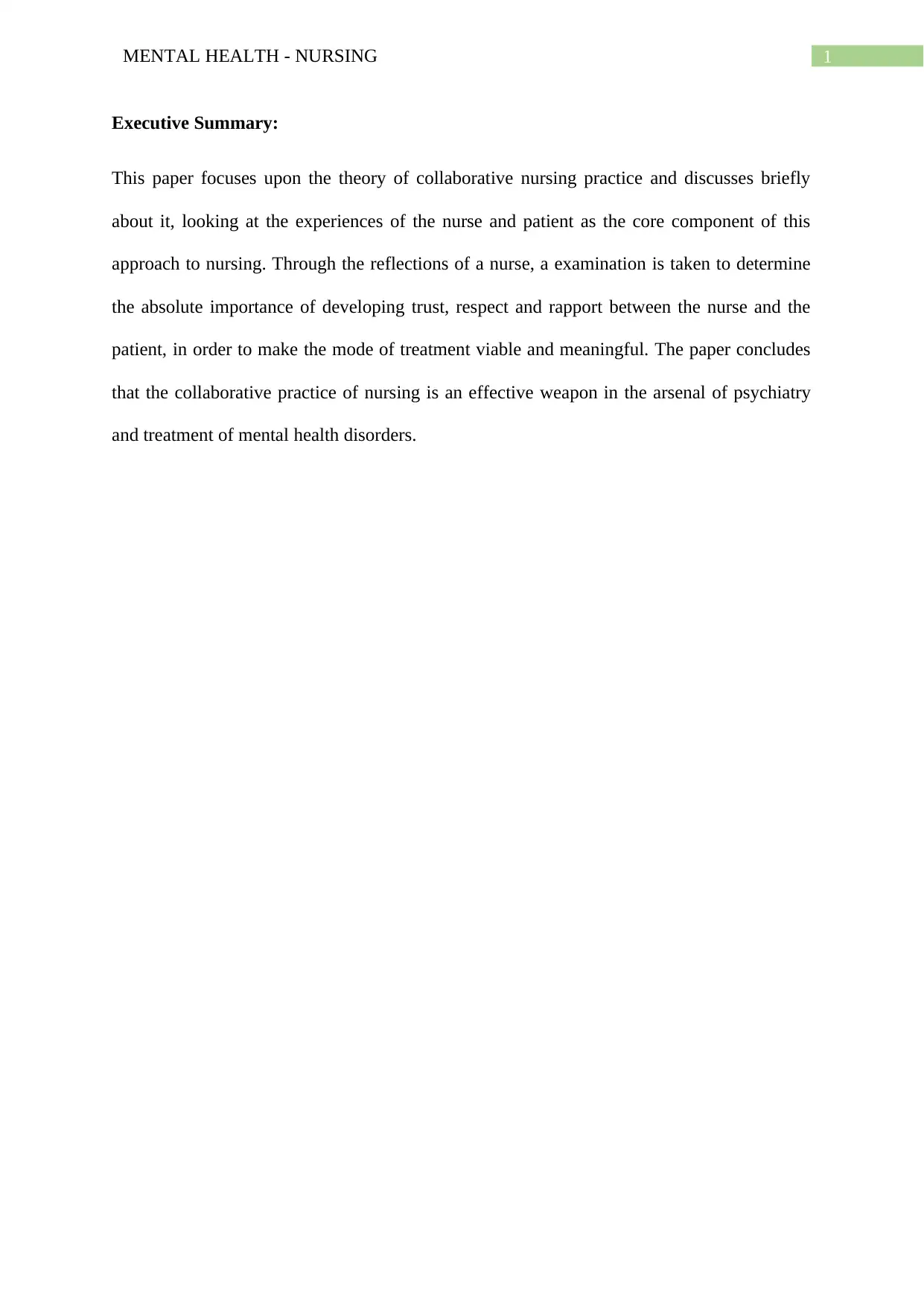
1MENTAL HEALTH - NURSING
Executive Summary:
This paper focuses upon the theory of collaborative nursing practice and discusses briefly
about it, looking at the experiences of the nurse and patient as the core component of this
approach to nursing. Through the reflections of a nurse, a examination is taken to determine
the absolute importance of developing trust, respect and rapport between the nurse and the
patient, in order to make the mode of treatment viable and meaningful. The paper concludes
that the collaborative practice of nursing is an effective weapon in the arsenal of psychiatry
and treatment of mental health disorders.
Executive Summary:
This paper focuses upon the theory of collaborative nursing practice and discusses briefly
about it, looking at the experiences of the nurse and patient as the core component of this
approach to nursing. Through the reflections of a nurse, a examination is taken to determine
the absolute importance of developing trust, respect and rapport between the nurse and the
patient, in order to make the mode of treatment viable and meaningful. The paper concludes
that the collaborative practice of nursing is an effective weapon in the arsenal of psychiatry
and treatment of mental health disorders.
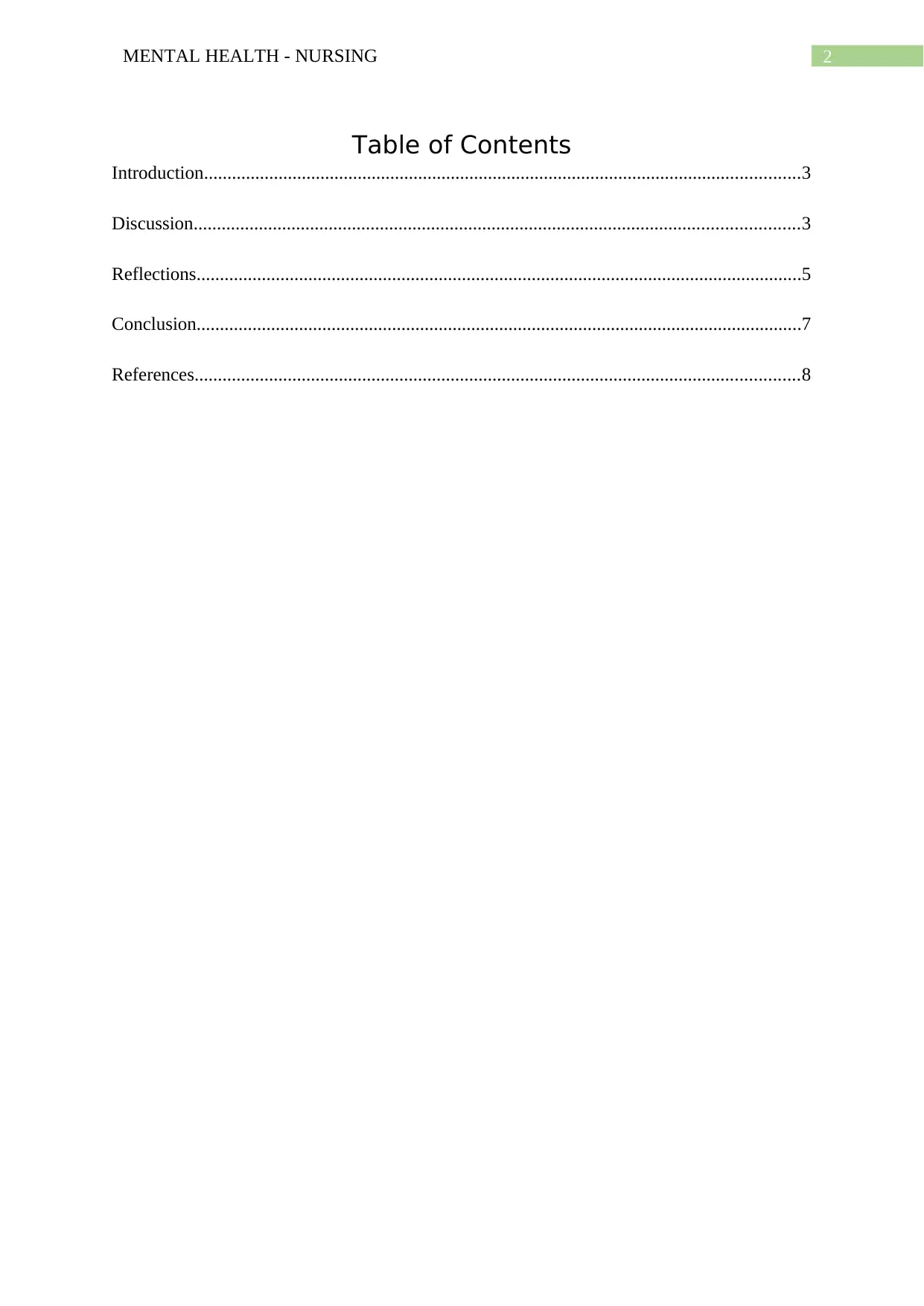
2MENTAL HEALTH - NURSING
Table of Contents
Introduction................................................................................................................................3
Discussion..................................................................................................................................3
Reflections..................................................................................................................................5
Conclusion..................................................................................................................................7
References..................................................................................................................................8
Table of Contents
Introduction................................................................................................................................3
Discussion..................................................................................................................................3
Reflections..................................................................................................................................5
Conclusion..................................................................................................................................7
References..................................................................................................................................8
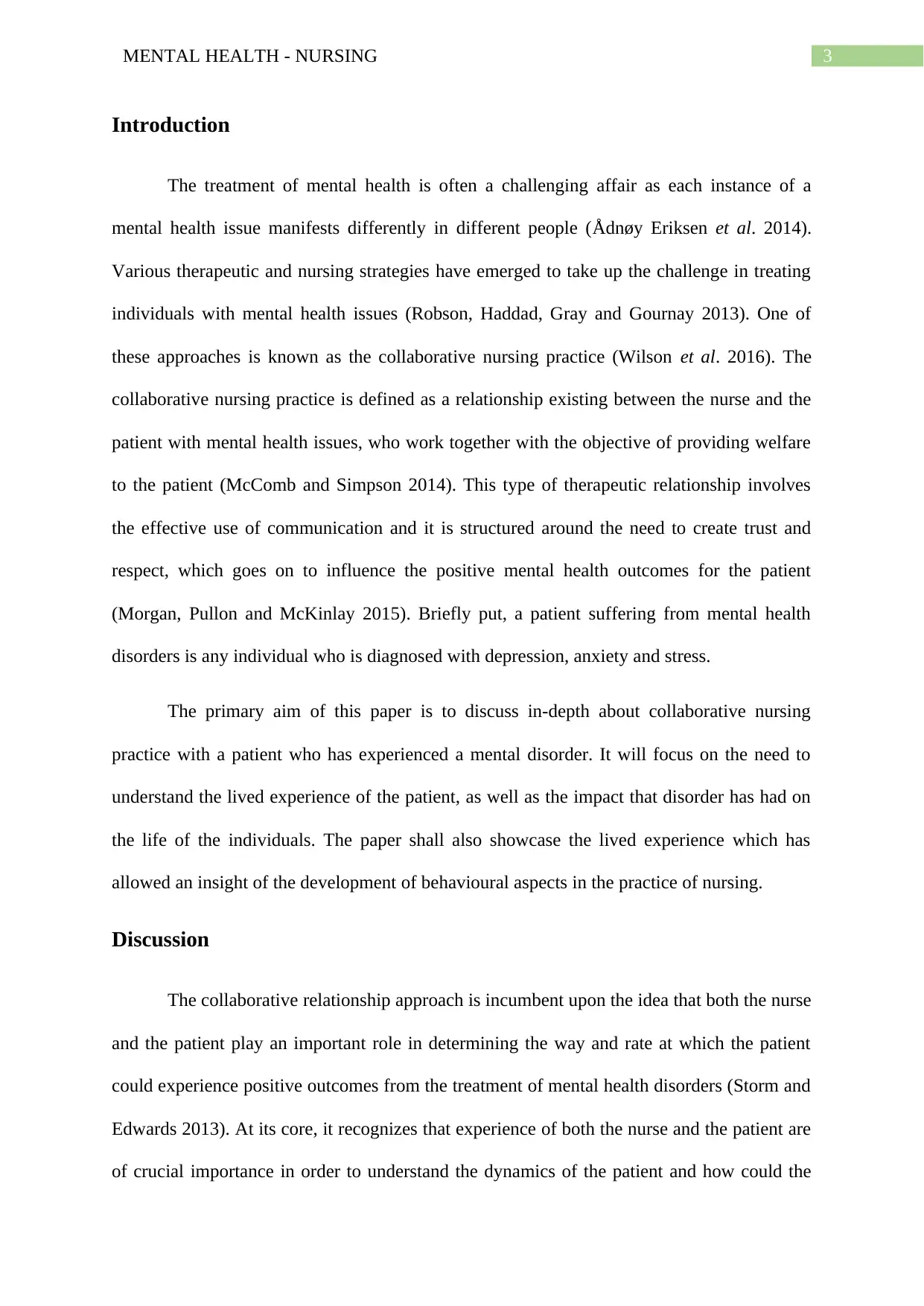
3MENTAL HEALTH - NURSING
Introduction
The treatment of mental health is often a challenging affair as each instance of a
mental health issue manifests differently in different people (Ådnøy Eriksen et al. 2014).
Various therapeutic and nursing strategies have emerged to take up the challenge in treating
individuals with mental health issues (Robson, Haddad, Gray and Gournay 2013). One of
these approaches is known as the collaborative nursing practice (Wilson et al. 2016). The
collaborative nursing practice is defined as a relationship existing between the nurse and the
patient with mental health issues, who work together with the objective of providing welfare
to the patient (McComb and Simpson 2014). This type of therapeutic relationship involves
the effective use of communication and it is structured around the need to create trust and
respect, which goes on to influence the positive mental health outcomes for the patient
(Morgan, Pullon and McKinlay 2015). Briefly put, a patient suffering from mental health
disorders is any individual who is diagnosed with depression, anxiety and stress.
The primary aim of this paper is to discuss in-depth about collaborative nursing
practice with a patient who has experienced a mental disorder. It will focus on the need to
understand the lived experience of the patient, as well as the impact that disorder has had on
the life of the individuals. The paper shall also showcase the lived experience which has
allowed an insight of the development of behavioural aspects in the practice of nursing.
Discussion
The collaborative relationship approach is incumbent upon the idea that both the nurse
and the patient play an important role in determining the way and rate at which the patient
could experience positive outcomes from the treatment of mental health disorders (Storm and
Edwards 2013). At its core, it recognizes that experience of both the nurse and the patient are
of crucial importance in order to understand the dynamics of the patient and how could the
Introduction
The treatment of mental health is often a challenging affair as each instance of a
mental health issue manifests differently in different people (Ådnøy Eriksen et al. 2014).
Various therapeutic and nursing strategies have emerged to take up the challenge in treating
individuals with mental health issues (Robson, Haddad, Gray and Gournay 2013). One of
these approaches is known as the collaborative nursing practice (Wilson et al. 2016). The
collaborative nursing practice is defined as a relationship existing between the nurse and the
patient with mental health issues, who work together with the objective of providing welfare
to the patient (McComb and Simpson 2014). This type of therapeutic relationship involves
the effective use of communication and it is structured around the need to create trust and
respect, which goes on to influence the positive mental health outcomes for the patient
(Morgan, Pullon and McKinlay 2015). Briefly put, a patient suffering from mental health
disorders is any individual who is diagnosed with depression, anxiety and stress.
The primary aim of this paper is to discuss in-depth about collaborative nursing
practice with a patient who has experienced a mental disorder. It will focus on the need to
understand the lived experience of the patient, as well as the impact that disorder has had on
the life of the individuals. The paper shall also showcase the lived experience which has
allowed an insight of the development of behavioural aspects in the practice of nursing.
Discussion
The collaborative relationship approach is incumbent upon the idea that both the nurse
and the patient play an important role in determining the way and rate at which the patient
could experience positive outcomes from the treatment of mental health disorders (Storm and
Edwards 2013). At its core, it recognizes that experience of both the nurse and the patient are
of crucial importance in order to understand the dynamics of the patient and how could the
Secure Best Marks with AI Grader
Need help grading? Try our AI Grader for instant feedback on your assignments.
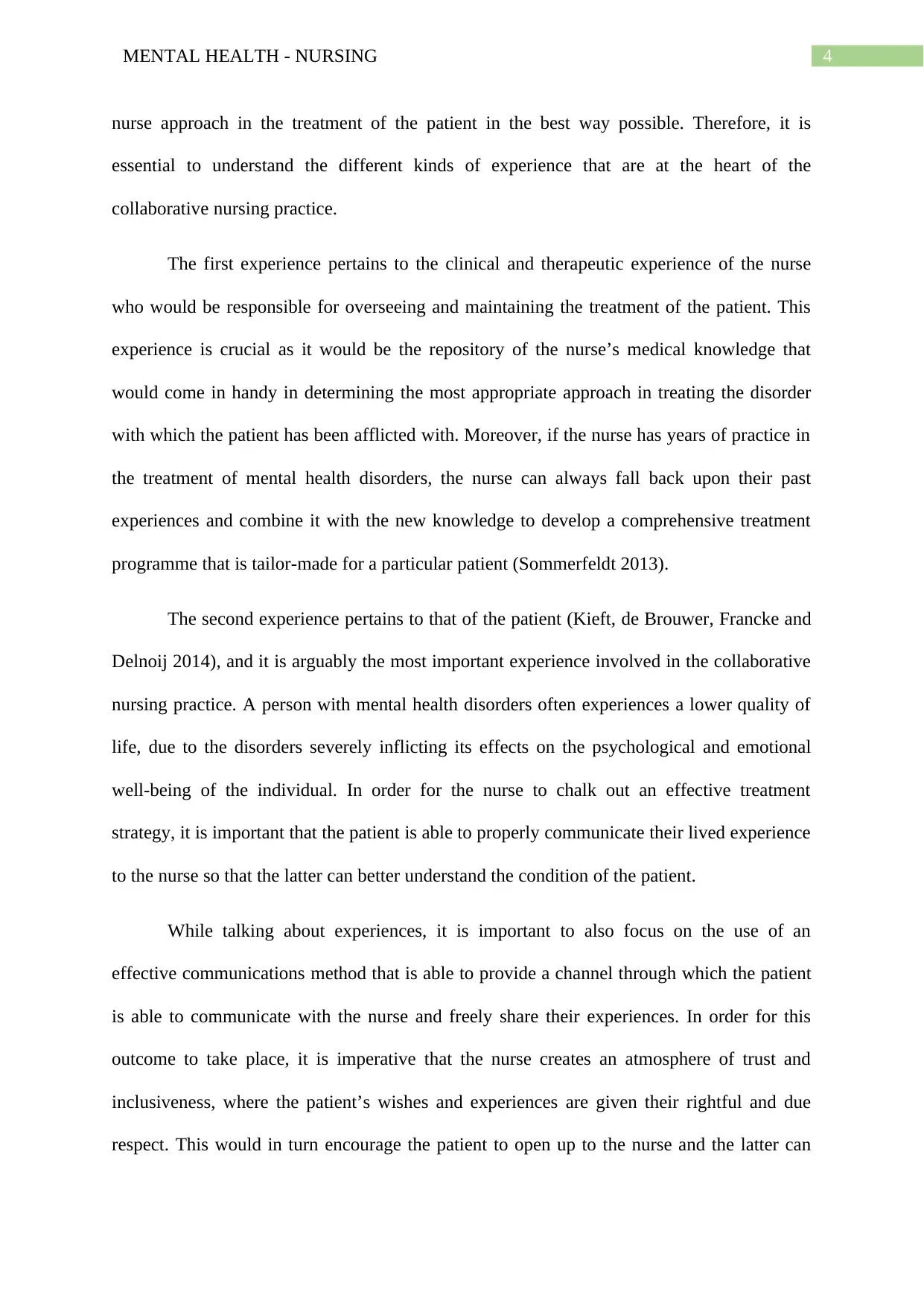
4MENTAL HEALTH - NURSING
nurse approach in the treatment of the patient in the best way possible. Therefore, it is
essential to understand the different kinds of experience that are at the heart of the
collaborative nursing practice.
The first experience pertains to the clinical and therapeutic experience of the nurse
who would be responsible for overseeing and maintaining the treatment of the patient. This
experience is crucial as it would be the repository of the nurse’s medical knowledge that
would come in handy in determining the most appropriate approach in treating the disorder
with which the patient has been afflicted with. Moreover, if the nurse has years of practice in
the treatment of mental health disorders, the nurse can always fall back upon their past
experiences and combine it with the new knowledge to develop a comprehensive treatment
programme that is tailor-made for a particular patient (Sommerfeldt 2013).
The second experience pertains to that of the patient (Kieft, de Brouwer, Francke and
Delnoij 2014), and it is arguably the most important experience involved in the collaborative
nursing practice. A person with mental health disorders often experiences a lower quality of
life, due to the disorders severely inflicting its effects on the psychological and emotional
well-being of the individual. In order for the nurse to chalk out an effective treatment
strategy, it is important that the patient is able to properly communicate their lived experience
to the nurse so that the latter can better understand the condition of the patient.
While talking about experiences, it is important to also focus on the use of an
effective communications method that is able to provide a channel through which the patient
is able to communicate with the nurse and freely share their experiences. In order for this
outcome to take place, it is imperative that the nurse creates an atmosphere of trust and
inclusiveness, where the patient’s wishes and experiences are given their rightful and due
respect. This would in turn encourage the patient to open up to the nurse and the latter can
nurse approach in the treatment of the patient in the best way possible. Therefore, it is
essential to understand the different kinds of experience that are at the heart of the
collaborative nursing practice.
The first experience pertains to the clinical and therapeutic experience of the nurse
who would be responsible for overseeing and maintaining the treatment of the patient. This
experience is crucial as it would be the repository of the nurse’s medical knowledge that
would come in handy in determining the most appropriate approach in treating the disorder
with which the patient has been afflicted with. Moreover, if the nurse has years of practice in
the treatment of mental health disorders, the nurse can always fall back upon their past
experiences and combine it with the new knowledge to develop a comprehensive treatment
programme that is tailor-made for a particular patient (Sommerfeldt 2013).
The second experience pertains to that of the patient (Kieft, de Brouwer, Francke and
Delnoij 2014), and it is arguably the most important experience involved in the collaborative
nursing practice. A person with mental health disorders often experiences a lower quality of
life, due to the disorders severely inflicting its effects on the psychological and emotional
well-being of the individual. In order for the nurse to chalk out an effective treatment
strategy, it is important that the patient is able to properly communicate their lived experience
to the nurse so that the latter can better understand the condition of the patient.
While talking about experiences, it is important to also focus on the use of an
effective communications method that is able to provide a channel through which the patient
is able to communicate with the nurse and freely share their experiences. In order for this
outcome to take place, it is imperative that the nurse creates an atmosphere of trust and
inclusiveness, where the patient’s wishes and experiences are given their rightful and due
respect. This would in turn encourage the patient to open up to the nurse and the latter can
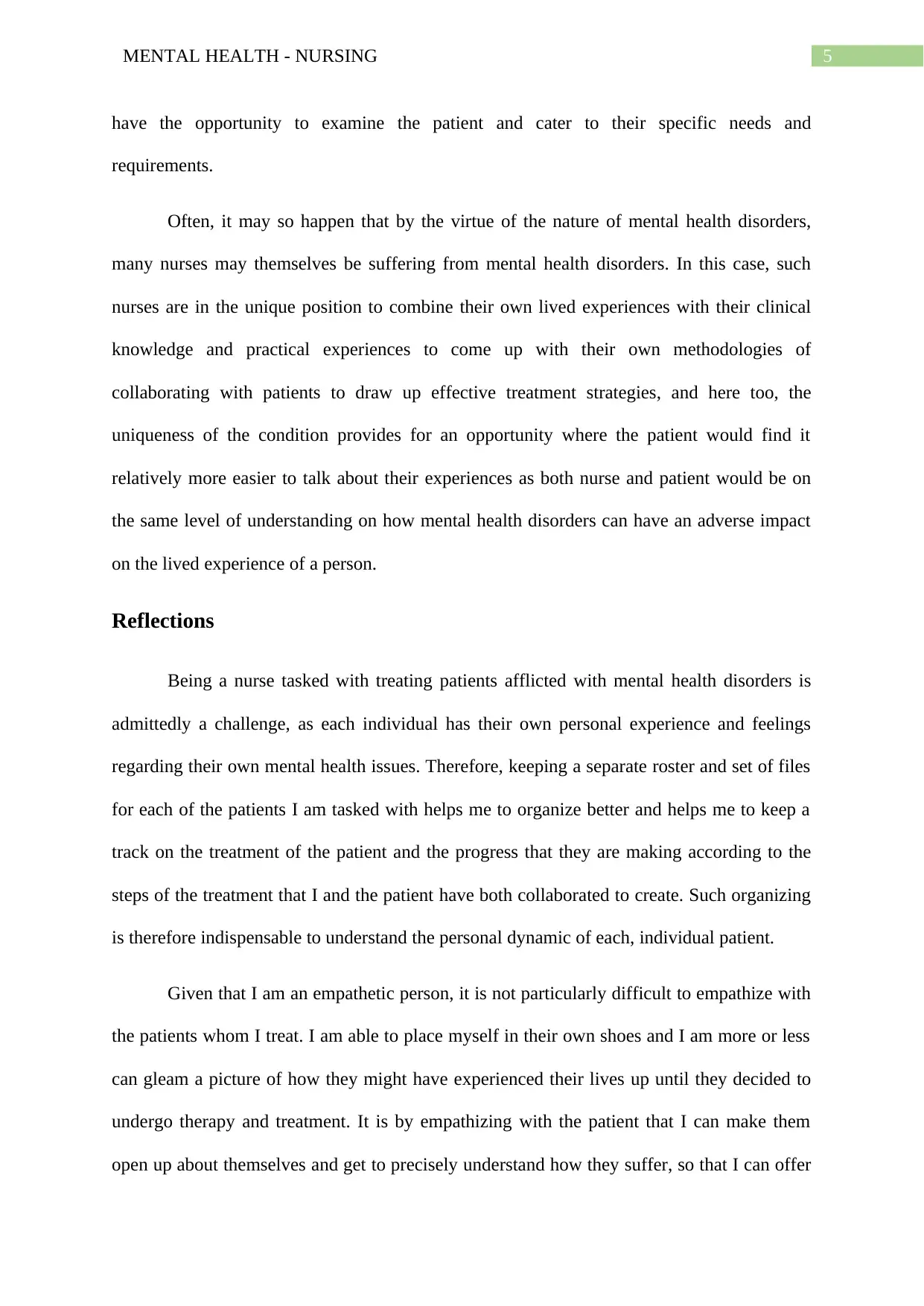
5MENTAL HEALTH - NURSING
have the opportunity to examine the patient and cater to their specific needs and
requirements.
Often, it may so happen that by the virtue of the nature of mental health disorders,
many nurses may themselves be suffering from mental health disorders. In this case, such
nurses are in the unique position to combine their own lived experiences with their clinical
knowledge and practical experiences to come up with their own methodologies of
collaborating with patients to draw up effective treatment strategies, and here too, the
uniqueness of the condition provides for an opportunity where the patient would find it
relatively more easier to talk about their experiences as both nurse and patient would be on
the same level of understanding on how mental health disorders can have an adverse impact
on the lived experience of a person.
Reflections
Being a nurse tasked with treating patients afflicted with mental health disorders is
admittedly a challenge, as each individual has their own personal experience and feelings
regarding their own mental health issues. Therefore, keeping a separate roster and set of files
for each of the patients I am tasked with helps me to organize better and helps me to keep a
track on the treatment of the patient and the progress that they are making according to the
steps of the treatment that I and the patient have both collaborated to create. Such organizing
is therefore indispensable to understand the personal dynamic of each, individual patient.
Given that I am an empathetic person, it is not particularly difficult to empathize with
the patients whom I treat. I am able to place myself in their own shoes and I am more or less
can gleam a picture of how they might have experienced their lives up until they decided to
undergo therapy and treatment. It is by empathizing with the patient that I can make them
open up about themselves and get to precisely understand how they suffer, so that I can offer
have the opportunity to examine the patient and cater to their specific needs and
requirements.
Often, it may so happen that by the virtue of the nature of mental health disorders,
many nurses may themselves be suffering from mental health disorders. In this case, such
nurses are in the unique position to combine their own lived experiences with their clinical
knowledge and practical experiences to come up with their own methodologies of
collaborating with patients to draw up effective treatment strategies, and here too, the
uniqueness of the condition provides for an opportunity where the patient would find it
relatively more easier to talk about their experiences as both nurse and patient would be on
the same level of understanding on how mental health disorders can have an adverse impact
on the lived experience of a person.
Reflections
Being a nurse tasked with treating patients afflicted with mental health disorders is
admittedly a challenge, as each individual has their own personal experience and feelings
regarding their own mental health issues. Therefore, keeping a separate roster and set of files
for each of the patients I am tasked with helps me to organize better and helps me to keep a
track on the treatment of the patient and the progress that they are making according to the
steps of the treatment that I and the patient have both collaborated to create. Such organizing
is therefore indispensable to understand the personal dynamic of each, individual patient.
Given that I am an empathetic person, it is not particularly difficult to empathize with
the patients whom I treat. I am able to place myself in their own shoes and I am more or less
can gleam a picture of how they might have experienced their lives up until they decided to
undergo therapy and treatment. It is by empathizing with the patient that I can make them
open up about themselves and get to precisely understand how they suffer, so that I can offer
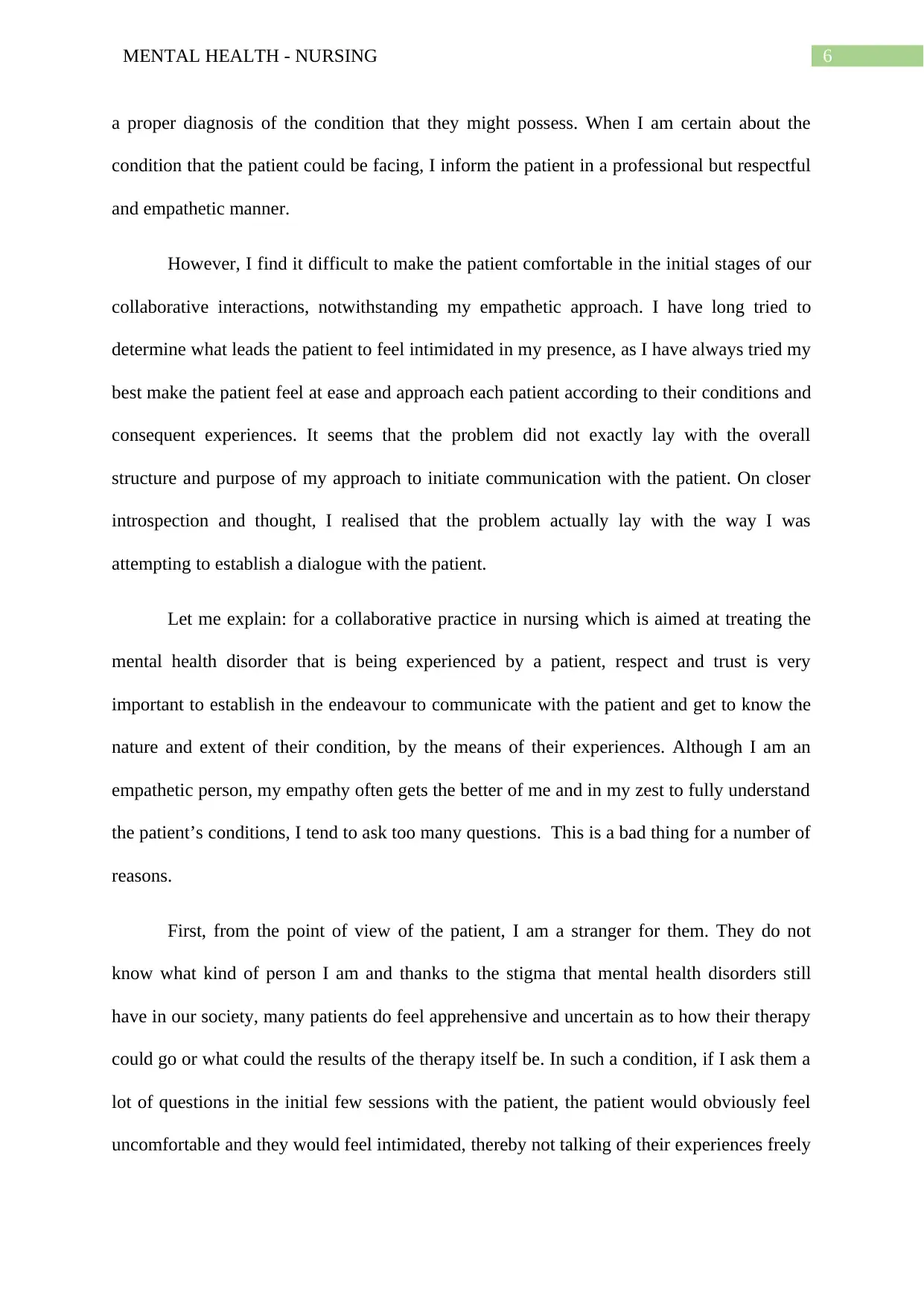
6MENTAL HEALTH - NURSING
a proper diagnosis of the condition that they might possess. When I am certain about the
condition that the patient could be facing, I inform the patient in a professional but respectful
and empathetic manner.
However, I find it difficult to make the patient comfortable in the initial stages of our
collaborative interactions, notwithstanding my empathetic approach. I have long tried to
determine what leads the patient to feel intimidated in my presence, as I have always tried my
best make the patient feel at ease and approach each patient according to their conditions and
consequent experiences. It seems that the problem did not exactly lay with the overall
structure and purpose of my approach to initiate communication with the patient. On closer
introspection and thought, I realised that the problem actually lay with the way I was
attempting to establish a dialogue with the patient.
Let me explain: for a collaborative practice in nursing which is aimed at treating the
mental health disorder that is being experienced by a patient, respect and trust is very
important to establish in the endeavour to communicate with the patient and get to know the
nature and extent of their condition, by the means of their experiences. Although I am an
empathetic person, my empathy often gets the better of me and in my zest to fully understand
the patient’s conditions, I tend to ask too many questions. This is a bad thing for a number of
reasons.
First, from the point of view of the patient, I am a stranger for them. They do not
know what kind of person I am and thanks to the stigma that mental health disorders still
have in our society, many patients do feel apprehensive and uncertain as to how their therapy
could go or what could the results of the therapy itself be. In such a condition, if I ask them a
lot of questions in the initial few sessions with the patient, the patient would obviously feel
uncomfortable and they would feel intimidated, thereby not talking of their experiences freely
a proper diagnosis of the condition that they might possess. When I am certain about the
condition that the patient could be facing, I inform the patient in a professional but respectful
and empathetic manner.
However, I find it difficult to make the patient comfortable in the initial stages of our
collaborative interactions, notwithstanding my empathetic approach. I have long tried to
determine what leads the patient to feel intimidated in my presence, as I have always tried my
best make the patient feel at ease and approach each patient according to their conditions and
consequent experiences. It seems that the problem did not exactly lay with the overall
structure and purpose of my approach to initiate communication with the patient. On closer
introspection and thought, I realised that the problem actually lay with the way I was
attempting to establish a dialogue with the patient.
Let me explain: for a collaborative practice in nursing which is aimed at treating the
mental health disorder that is being experienced by a patient, respect and trust is very
important to establish in the endeavour to communicate with the patient and get to know the
nature and extent of their condition, by the means of their experiences. Although I am an
empathetic person, my empathy often gets the better of me and in my zest to fully understand
the patient’s conditions, I tend to ask too many questions. This is a bad thing for a number of
reasons.
First, from the point of view of the patient, I am a stranger for them. They do not
know what kind of person I am and thanks to the stigma that mental health disorders still
have in our society, many patients do feel apprehensive and uncertain as to how their therapy
could go or what could the results of the therapy itself be. In such a condition, if I ask them a
lot of questions in the initial few sessions with the patient, the patient would obviously feel
uncomfortable and they would feel intimidated, thereby not talking of their experiences freely
Paraphrase This Document
Need a fresh take? Get an instant paraphrase of this document with our AI Paraphraser
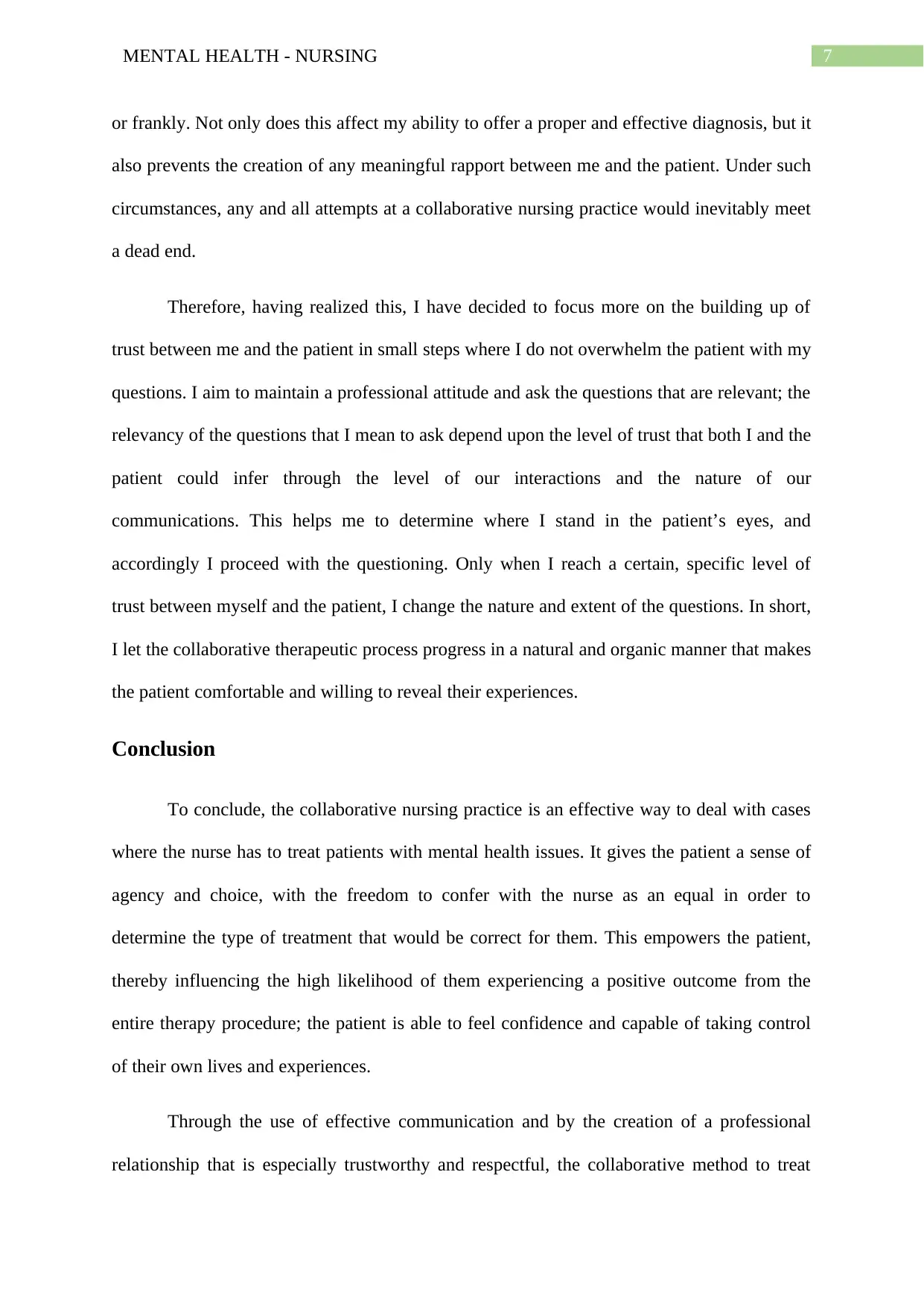
7MENTAL HEALTH - NURSING
or frankly. Not only does this affect my ability to offer a proper and effective diagnosis, but it
also prevents the creation of any meaningful rapport between me and the patient. Under such
circumstances, any and all attempts at a collaborative nursing practice would inevitably meet
a dead end.
Therefore, having realized this, I have decided to focus more on the building up of
trust between me and the patient in small steps where I do not overwhelm the patient with my
questions. I aim to maintain a professional attitude and ask the questions that are relevant; the
relevancy of the questions that I mean to ask depend upon the level of trust that both I and the
patient could infer through the level of our interactions and the nature of our
communications. This helps me to determine where I stand in the patient’s eyes, and
accordingly I proceed with the questioning. Only when I reach a certain, specific level of
trust between myself and the patient, I change the nature and extent of the questions. In short,
I let the collaborative therapeutic process progress in a natural and organic manner that makes
the patient comfortable and willing to reveal their experiences.
Conclusion
To conclude, the collaborative nursing practice is an effective way to deal with cases
where the nurse has to treat patients with mental health issues. It gives the patient a sense of
agency and choice, with the freedom to confer with the nurse as an equal in order to
determine the type of treatment that would be correct for them. This empowers the patient,
thereby influencing the high likelihood of them experiencing a positive outcome from the
entire therapy procedure; the patient is able to feel confidence and capable of taking control
of their own lives and experiences.
Through the use of effective communication and by the creation of a professional
relationship that is especially trustworthy and respectful, the collaborative method to treat
or frankly. Not only does this affect my ability to offer a proper and effective diagnosis, but it
also prevents the creation of any meaningful rapport between me and the patient. Under such
circumstances, any and all attempts at a collaborative nursing practice would inevitably meet
a dead end.
Therefore, having realized this, I have decided to focus more on the building up of
trust between me and the patient in small steps where I do not overwhelm the patient with my
questions. I aim to maintain a professional attitude and ask the questions that are relevant; the
relevancy of the questions that I mean to ask depend upon the level of trust that both I and the
patient could infer through the level of our interactions and the nature of our
communications. This helps me to determine where I stand in the patient’s eyes, and
accordingly I proceed with the questioning. Only when I reach a certain, specific level of
trust between myself and the patient, I change the nature and extent of the questions. In short,
I let the collaborative therapeutic process progress in a natural and organic manner that makes
the patient comfortable and willing to reveal their experiences.
Conclusion
To conclude, the collaborative nursing practice is an effective way to deal with cases
where the nurse has to treat patients with mental health issues. It gives the patient a sense of
agency and choice, with the freedom to confer with the nurse as an equal in order to
determine the type of treatment that would be correct for them. This empowers the patient,
thereby influencing the high likelihood of them experiencing a positive outcome from the
entire therapy procedure; the patient is able to feel confidence and capable of taking control
of their own lives and experiences.
Through the use of effective communication and by the creation of a professional
relationship that is especially trustworthy and respectful, the collaborative method to treat

8MENTAL HEALTH - NURSING
mental health disorders has the potential to be a huge milestone in the treatment of mental
health and the care given to individuals suffering from mental health issues. By valuing the
patient as an important pillar of this approach, the nurse would be at a better position to
discern and diagnose the patient’s condition efficiently, accurately and within a relatively
shorter span of time, thereby making psychiatric treatment viable and significant.
mental health disorders has the potential to be a huge milestone in the treatment of mental
health and the care given to individuals suffering from mental health issues. By valuing the
patient as an important pillar of this approach, the nurse would be at a better position to
discern and diagnose the patient’s condition efficiently, accurately and within a relatively
shorter span of time, thereby making psychiatric treatment viable and significant.
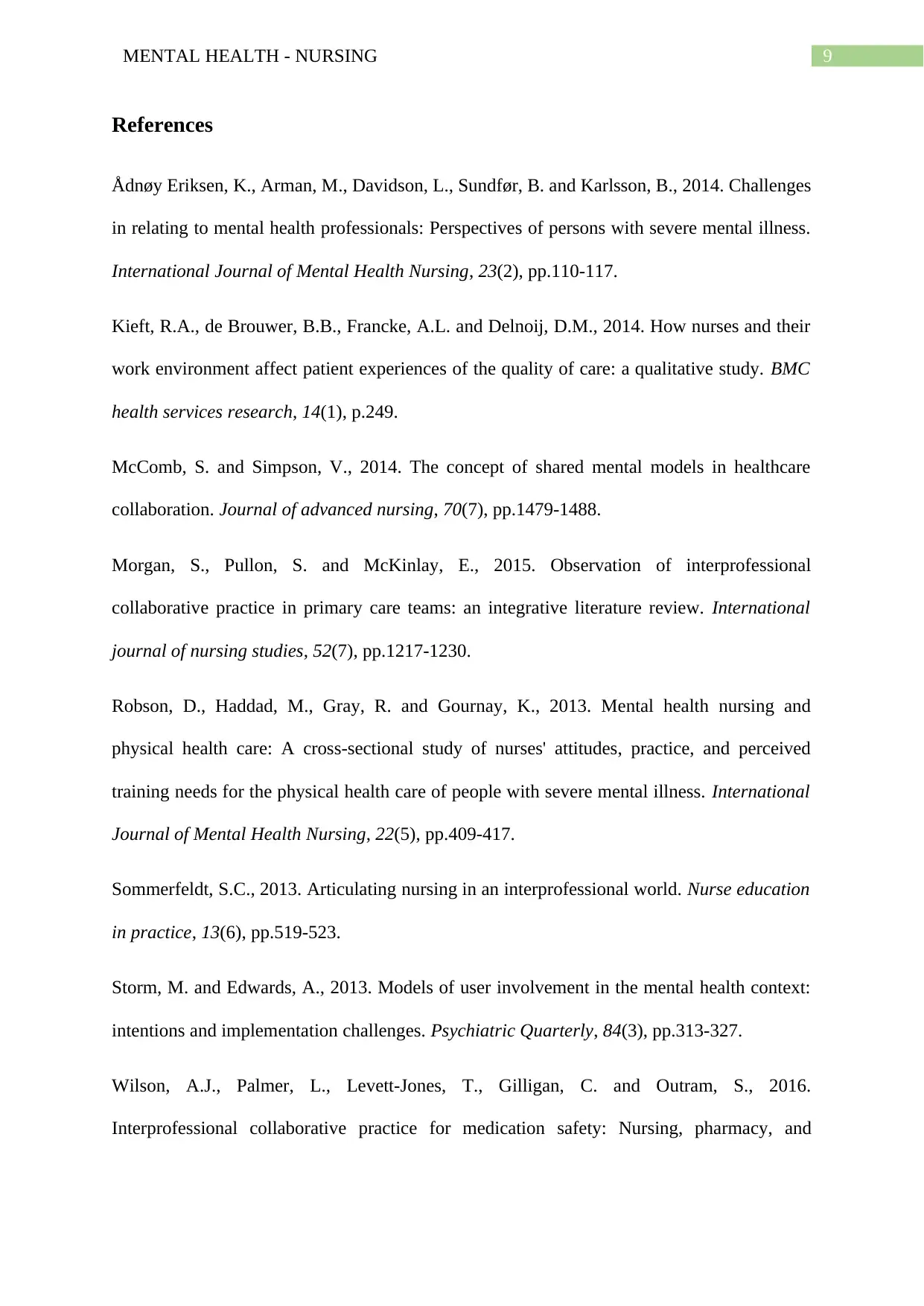
9MENTAL HEALTH - NURSING
References
Ådnøy Eriksen, K., Arman, M., Davidson, L., Sundfør, B. and Karlsson, B., 2014. Challenges
in relating to mental health professionals: Perspectives of persons with severe mental illness.
International Journal of Mental Health Nursing, 23(2), pp.110-117.
Kieft, R.A., de Brouwer, B.B., Francke, A.L. and Delnoij, D.M., 2014. How nurses and their
work environment affect patient experiences of the quality of care: a qualitative study. BMC
health services research, 14(1), p.249.
McComb, S. and Simpson, V., 2014. The concept of shared mental models in healthcare
collaboration. Journal of advanced nursing, 70(7), pp.1479-1488.
Morgan, S., Pullon, S. and McKinlay, E., 2015. Observation of interprofessional
collaborative practice in primary care teams: an integrative literature review. International
journal of nursing studies, 52(7), pp.1217-1230.
Robson, D., Haddad, M., Gray, R. and Gournay, K., 2013. Mental health nursing and
physical health care: A cross‐sectional study of nurses' attitudes, practice, and perceived
training needs for the physical health care of people with severe mental illness. International
Journal of Mental Health Nursing, 22(5), pp.409-417.
Sommerfeldt, S.C., 2013. Articulating nursing in an interprofessional world. Nurse education
in practice, 13(6), pp.519-523.
Storm, M. and Edwards, A., 2013. Models of user involvement in the mental health context:
intentions and implementation challenges. Psychiatric Quarterly, 84(3), pp.313-327.
Wilson, A.J., Palmer, L., Levett-Jones, T., Gilligan, C. and Outram, S., 2016.
Interprofessional collaborative practice for medication safety: Nursing, pharmacy, and
References
Ådnøy Eriksen, K., Arman, M., Davidson, L., Sundfør, B. and Karlsson, B., 2014. Challenges
in relating to mental health professionals: Perspectives of persons with severe mental illness.
International Journal of Mental Health Nursing, 23(2), pp.110-117.
Kieft, R.A., de Brouwer, B.B., Francke, A.L. and Delnoij, D.M., 2014. How nurses and their
work environment affect patient experiences of the quality of care: a qualitative study. BMC
health services research, 14(1), p.249.
McComb, S. and Simpson, V., 2014. The concept of shared mental models in healthcare
collaboration. Journal of advanced nursing, 70(7), pp.1479-1488.
Morgan, S., Pullon, S. and McKinlay, E., 2015. Observation of interprofessional
collaborative practice in primary care teams: an integrative literature review. International
journal of nursing studies, 52(7), pp.1217-1230.
Robson, D., Haddad, M., Gray, R. and Gournay, K., 2013. Mental health nursing and
physical health care: A cross‐sectional study of nurses' attitudes, practice, and perceived
training needs for the physical health care of people with severe mental illness. International
Journal of Mental Health Nursing, 22(5), pp.409-417.
Sommerfeldt, S.C., 2013. Articulating nursing in an interprofessional world. Nurse education
in practice, 13(6), pp.519-523.
Storm, M. and Edwards, A., 2013. Models of user involvement in the mental health context:
intentions and implementation challenges. Psychiatric Quarterly, 84(3), pp.313-327.
Wilson, A.J., Palmer, L., Levett-Jones, T., Gilligan, C. and Outram, S., 2016.
Interprofessional collaborative practice for medication safety: Nursing, pharmacy, and
Secure Best Marks with AI Grader
Need help grading? Try our AI Grader for instant feedback on your assignments.

10MENTAL HEALTH - NURSING
medical graduates’ experiences and perspectives. Journal of interprofessional care, 30(5),
pp.649-654.
medical graduates’ experiences and perspectives. Journal of interprofessional care, 30(5),
pp.649-654.
1 out of 11
![[object Object]](/_next/static/media/star-bottom.7253800d.svg)




